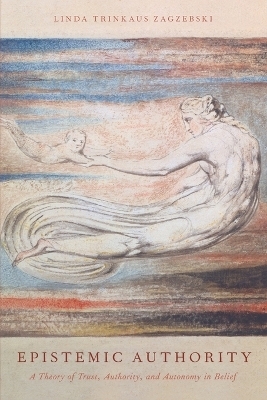
Epistemic Authority
Oxford University Press Inc (Verlag)
978-0-19-027826-7 (ISBN)
In this book Linda Trinkaus Zagzebski gives an extended argument that the self-reflective person is committed to belief on authority. Epistemic authority is compatible with autonomy, but epistemic self-reliance is incoherent. She argues that epistemic and emotional self-trust are rational and inescapable, that consistent self-trust commits us to trust in others, and that among those we are committed to trusting are some whom we ought to treat as epistemic authorities, modeled on the well-known principles of authority of Joseph Raz. Some of these authorities can be in the moral and religious domains.
Why have people for thousands of years accepted epistemic authority in religious communities? A religious community's justification for authority is typically based on beliefs unique to that community. Unfortunately, that often means that from the community's perspective, its justifying claims are insulated from the outside; whereas from an outside perspective, epistemic authority in the community appears unjustified. But as Zagzebski's argument shows, an individual's acceptance of authority in her community can be justified by principles that outsiders accept, and the particular beliefs justified by that authority are not immune to external critiques.
Linda Trinkaus Zagzebski is Kingfisher College Chair of the Philosophy of Religion & Ethics and George Lynn Cross Research Professor at the University of Oklahoma. Her work focuses on epistemology, philosophy of religion, virtue ethics, and the metaphysics of fatalism. She is the author of many books including On Epistemology (2008), On Philosophy of Religion: An Historical Introduction (2007), Divine Motivation Theory (2004),Virtues of the Mind (1996), The Dilemma of Freedom and Foreknowledge (1991).
Introduction ; Chapter 1 The rejection of epistemic authority ; 1. Authority, equality, and self-reliance in the epistemic realm ; 2. The epistemological case for epistemic self-reliance ; 2.1 Mistrust of taking beliefs from others ; 2.2 Self-reliance and the nature of knowledge: Plato and Locke ; 2.3 Self-reliance and Cartesian doubt ; 3. The case from ethics: self-reliance and autonomy ; 4. Authority and autonomy in the intellectual domain ; 5. The value of reflective self-consciousness ; Chapter 2 Epistemic self-trust ; 1. The natural authority of the self ; 2. The natural desire for truth and the pre-reflective self ; 3. The desire for truth and the reflective self ; 4. Self-trust and the alternatives ; 5. The conscientious believer and the nature of reasons ; Chapter 3 Epistemic trust in others ; 1. Epistemic egoism ; 2. The need for trust in others ; 2.1. Why epistemic egoism is unreasonable ; 2.2. Epistemic egocentrism ; 3. Trust in others and the two kinds of reasons ; 3.1 The distinction between deliberative and theoretical reasons ; 3.2 The two kinds of reasons and parity between self and others ; 4. Epistemic universalism and common consent arguments ; Chapter 4 Trust in emotions ; 1. The rational inescapability of emotional self-trust ; 2. Trustworthy and untrustworthy emotions ; 3. Admiration and trust in exemplars ; 4. Trust in the emotions of others ; 5. Expanding the range of trust ; Chapter 5 Trust and epistemic authority ; 1. Authority in the realm of belief ; 2. The contours of epistemic authority: the principles of Joseph Raz ; 3. Pre-emption and evidence ; 4. The value of truth vs. the value of self-reliance ; Chapter 6 The authority of testimony ; 1. Conscientious testimony ; 2. Testimony and deliberative vs. theoretical reasons ; 3. Principles of the authority of testimony ; 4. Testimony as evidence and the authority of testimony ; 5. The parallel between epistemic and practical authority ; Chapter 7 Epistemic authority in communities ; 1. Epistemic authority and the limits of the political model ; 2. Authority in small communities ; 2.1 Justifying authority in small communities ; 2.2 Justifying epistemic authority in small communities ; 3. Communal epistemic authority ; 4. The epistemology of imperfection ; Chapter 8 Moral authority ; 1. The prima facie case for moral epistemic authority ; 2. Skepticism about moral authority ; 2.1 Skepticism about moral truth ; 2.2 Moral egalitarianism ; 2.3 Autonomy ; 3. Moral authority and the limits of testimony ; 3.1 Emotion and moral belief ; 3.2 Moral authority and understanding ; 4. Communal moral authority and conscience ; Chapter 9 Religious authority ; 1. Religious epistemic egoism ; 2. Religious epistemic universalism ; 3. Believing divine testimony ; 3.1 Faith and believing persons ; 3.2 Models of revelation ; 4. Conscientious belief and religious authority ; Chapter 10 Trust and disagreement ; 1. The antinomy of reasonable disagreement ; 2. Disagreement and deliberative vs. theoretical reasons ; 3. Self-trust and resolving disagreement ; 4. Communal epistemic egoism and disagreement between communities ; Chapter 11 Autonomy ; 1. The autonomous self ; 1.1 The norm of conscientious self-reflection ; 1.2 Autonomy from the inside and the outside ; 2. Attacks on the possibility of autonomy: Debunking self-trust ; 3. Epistemic authority from the outside ; 4. Self-fulfillment ; Bibliography ; Index
| Erscheint lt. Verlag | 14.1.2016 |
|---|---|
| Verlagsort | New York |
| Sprache | englisch |
| Maße | 234 x 155 mm |
| Gewicht | 476 g |
| Themenwelt | Geisteswissenschaften ► Philosophie ► Erkenntnistheorie / Wissenschaftstheorie |
| Geisteswissenschaften ► Religion / Theologie | |
| ISBN-10 | 0-19-027826-9 / 0190278269 |
| ISBN-13 | 978-0-19-027826-7 / 9780190278267 |
| Zustand | Neuware |
| Informationen gemäß Produktsicherheitsverordnung (GPSR) | |
| Haben Sie eine Frage zum Produkt? |
aus dem Bereich

![Was heißt Denken?. Vorlesung Wintersemester 1951/52. [Was bedeutet das alles?] - Martin Heidegger](/media/113619842)
